Make Your Own Electrolyte Drink with Potassium

The First Signs of a Nutrient Deficiency
Learn how to recognize early symptoms related to specific nutrient deficiencies
Receive a downloadable list of early indicators your body is lacking key nutrients

The First Signs of a Nutrient Deficiency
Learn how to recognize early symptoms related to specific nutrient deficiencies
Receive a downloadable list of early indicators your body is lacking key nutrients

The First Signs of a Nutrient Deficiency
Learn how to recognize early symptoms related to specific nutrient deficiencies
Receive a downloadable list of early indicators your body is lacking key nutrients

The First Signs of a Nutrient Deficiency
Learn how to recognize early symptoms related to specific nutrient deficiencies
Receive a downloadable list of early indicators your body is lacking key nutrients

The First Signs of a Nutrient Deficiency
Learn how to recognize early symptoms related to specific nutrient deficiencies
Receive a downloadable list of early indicators your body is lacking key nutrients

The First Signs of a Nutrient Deficiency
Learn how to recognize early symptoms related to specific nutrient deficiencies
Receive a downloadable list of early indicators your body is lacking key nutrients

The First Signs of a Nutrient Deficiency
Learn how to recognize early symptoms related to specific nutrient deficiencies
Receive a downloadable list of early indicators your body is lacking key nutrients

The First Signs of a Nutrient Deficiency
Learn how to recognize early symptoms related to specific nutrient deficiencies
Receive a downloadable list of early indicators your body is lacking key nutrients

The First Signs of a Nutrient Deficiency
Learn how to recognize early symptoms related to specific nutrient deficiencies
Receive a downloadable list of early indicators your body is lacking key nutrients

The First Signs of a Nutrient Deficiency
Learn how to recognize early symptoms related to specific nutrient deficiencies
Receive a downloadable list of early indicators your body is lacking key nutrients

The First Signs of a Nutrient Deficiency
Learn how to recognize early symptoms related to specific nutrient deficiencies
Receive a downloadable list of early indicators your body is lacking key nutrients

The First Signs of a Nutrient Deficiency
Learn how to recognize early symptoms related to specific nutrient deficiencies
Receive a downloadable list of early indicators your body is lacking key nutrients

The First Signs of a Nutrient Deficiency
Learn how to recognize early symptoms related to specific nutrient deficiencies
Receive a downloadable list of early indicators your body is lacking key nutrients

The First Signs of a Nutrient Deficiency
Learn how to recognize early symptoms related to specific nutrient deficiencies
Receive a downloadable list of early indicators your body is lacking key nutrients

The First Signs of a Nutrient Deficiency
Learn how to recognize early symptoms related to specific nutrient deficiencies
Receive a downloadable list of early indicators your body is lacking key nutrients

The First Signs of a Nutrient Deficiency
Learn how to recognize early symptoms related to specific nutrient deficiencies
Receive a downloadable list of early indicators your body is lacking key nutrients
Potassium is an important electrolyte needed to maintain the body's normal functioning. Unfortunately, many people don’t get enough potassium from their diet, leaving them at risk of deficiency.
Learn how to make your own electrolyte drink with potassium and discover why you should avoid drinking traditional sports drinks to replenish fluids and electrolytes.
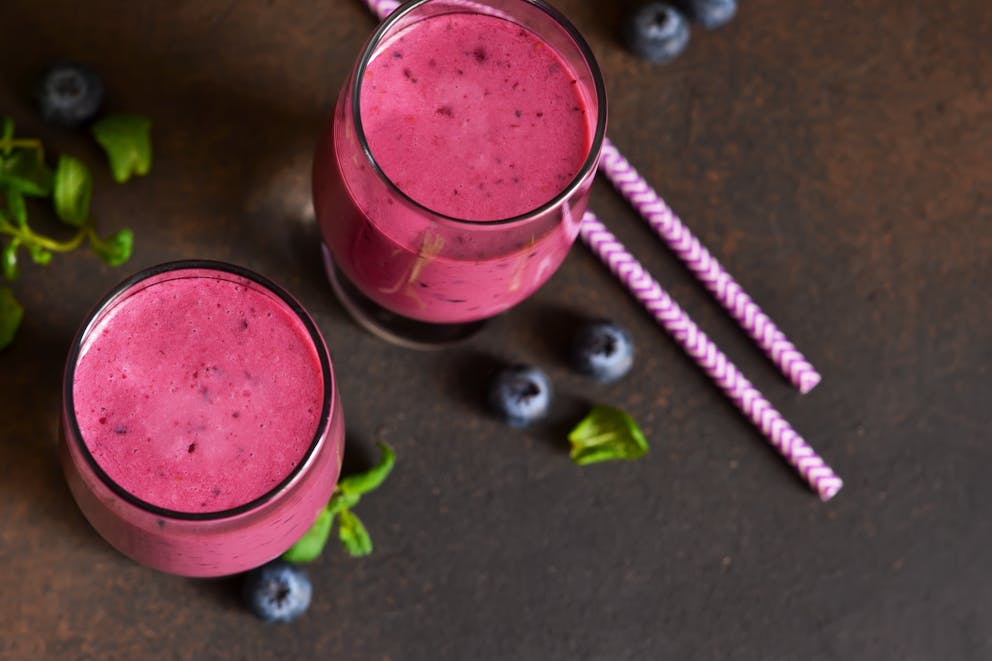
Homemade electrolyte drink with potassium recipe
Making your own homemade electrolyte drink is an excellent way to replenish electrolytes.
Check out this easy homemade electrolyte drink recipe!
Ingredients
1 ripe avocado
1 cup berries
1/2 cup lemon juice
1 Tbsp apple cider vinegar
1/4 tsp Himalayan pink salt, sea salt, or table salt
5 cups water or ice cubes (to desired consistency)
20 drops of berry or lemon-flavored stevia (optional)
Instructions
Combine all ingredients in a blender, cover, and blend until smooth.
Drink immediately, or keep chilled in the fridge and sip throughout the day.
This natural electrolyte drink contains more than 1100 milligrams of potassium and is sweetened with stevia, making it a low-carb electrolyte source perfect for people on a ketogenic diet.
Watch the video below to learn how to make a DIY electrolyte drink!
The importance of potassium
Potassium is the most important but often overlooked electrolyte needed to maintain various physiological functions.
Potassium facilitates the contraction and relaxation of muscles. This is especially important for the heart muscle, which relies on potassium to maintain a regular heartbeat.
Adequate potassium levels are necessary for normal nerve function, including sending signals for muscle movement and maintaining a healthy nervous system.
Potassium works with other electrolytes, specifically sodium, to maintain fluid levels. This is crucial for blood pressure regulation, energy production, and overall cellular function.
In addition, potassium is needed to keep the body’s pH within a healthy range, promote healthy kidney function, support bone health, and help activate digestive enzymes necessary for normal digestion.
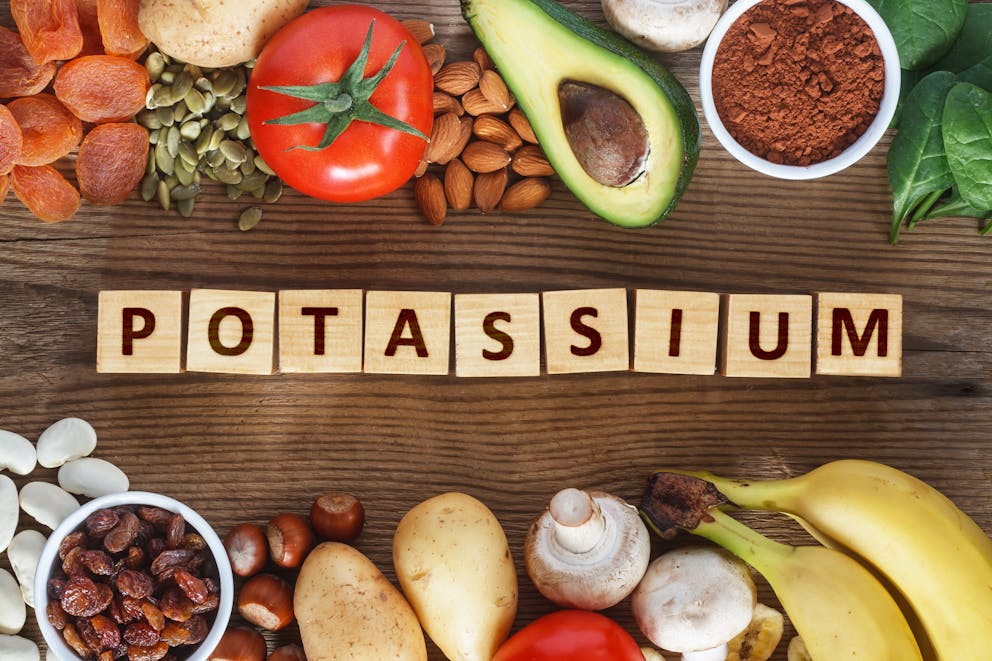
How much potassium do you need?
The recommended daily intake for adults is around 4700 milligrams of potassium per day.
However, data collected from the National Health and Nutrition Examination Survey found that most U.S. adults consume an average of 1900 milligrams daily, leaving the majority of the population at risk of deficiency and electrolyte imbalance.
It’s also important to remember that individuals with heavy exercise routines and athletes may need more potassium than 4700 milligrams daily to counteract electrolyte loss from sweating.
A diet high in refined and processed foods and not consuming enough vegetables are the main reasons for inadequate potassium intake, which is linked to several adverse health consequences.
Low levels of potassium can lead to a range of health issues, including:
High blood pressure
Irregular heartbeats
Muscle cramps
Fatigue
Blood sugar imbalances
Digestive problems
Brain fog and confusion

Do conventional sports drinks contain enough potassium?
Despite its importance for muscle function and energy production, most electrolyte drinks contain only around 30 to 90 milligrams of potassium per 8-ounce (240 ml) serving, which isn’t enough to maintain or replenish potassium levels.
It’s often argued that more sodium is lost through sweat than potassium and that there is no need for more potassium in electrolyte drinks.
However, most people already consume excessive amounts of sodium chloride—also known as table salt—and don’t meet their daily potassium intake recommendations, which explains why many people develop electrolyte imbalances.
And, what’s more, drinking conventional sports drinks can cause weight gain.
Store-bought electrolyte drinks are often high in sugar or contain artificial sweeteners that can cause metabolic and hormonal imbalances linked to accelerated potassium loss and weight gain.
Making your own homemade electrolyte drinks is an excellent way to ensure you get enough potassium without added sugars, excessive sodium, or artificial ingredients.
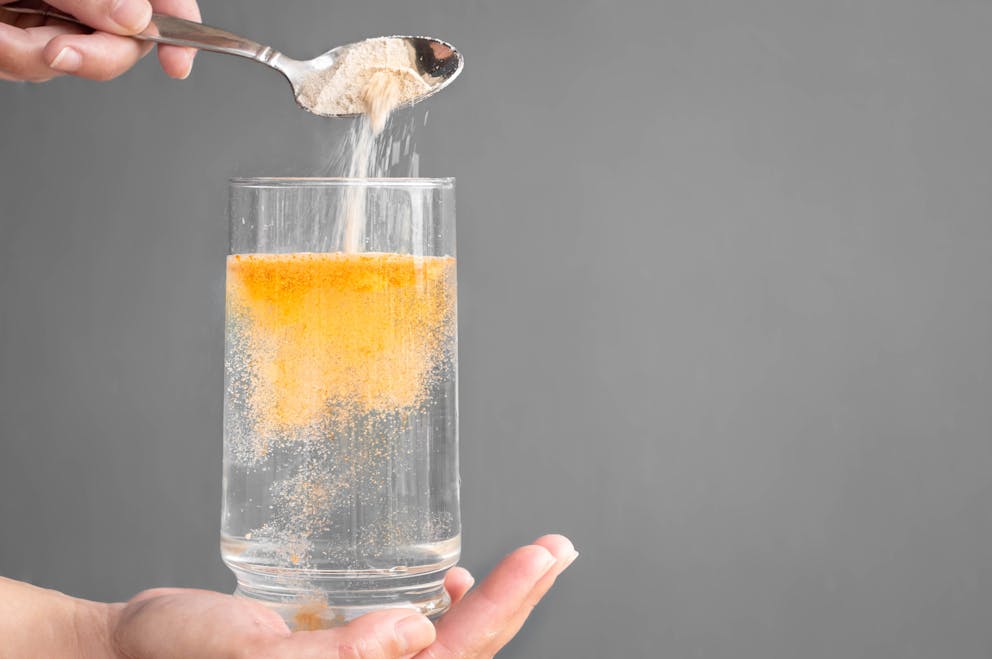
Six benefits of potassium
While most people only think of it as an electrolyte, potassium has amazing benefits beyond fluid balance and muscle contractions.
Here are six health benefits of potassium.
1. Blood pressure regulation
If you suffer from high blood pressure, you may not be salt-sensitive but have a potassium deficiency.
Sodium and potassium work in synergy to maintain the body’s fluid levels, essential for blood pressure regulation.
“A lack of potassium, especially if there is too much sodium in the body, causes fluid retention,” explains Dr. Berg. “This leads to increased blood volume and subsequently elevated blood pressure.”
2. Reduced risk of heart disease
In addition to promoting healthy blood pressure, potassium is essential for heart muscle contraction, and imbalanced potassium levels can affect the heart's ability to function correctly.
Low potassium levels can disrupt the electrical signals that regulate heartbeats and have been found to contribute to stiff and narrow blood vessels, a primary cause of atherosclerosis and heart attacks.
Research published in The Journal of the American College of Cardiology concluded, “Higher dietary potassium intake is associated with lower rates of stroke and might also reduce the risk of coronary heart disease and other cardiovascular diseases.”
3. Boosts energy
Increasing our intake of potassium can make us energetic.
Potassium ions help maintain an electrical charge within cells, which is necessary to generate adenosine triphosphate (ATP), the body’s main energy currency.
A recent study published in Function found that potassium ions stimulate the activity of ATP synthase, the enzyme needed to generate ATP, which increases energy production and enhances cellular energy reserves.
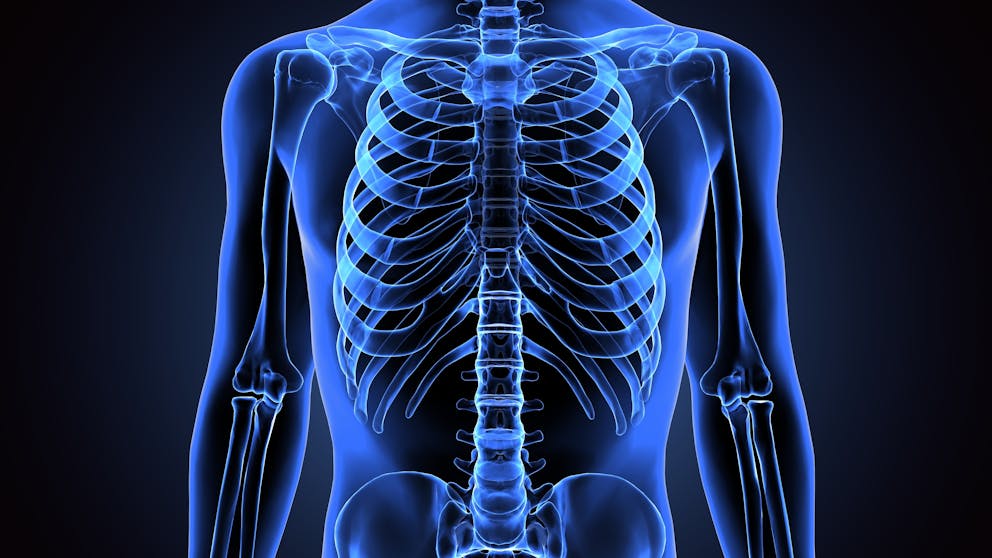 4. Bone health
4. Bone health
Potassium helps maintain the body's pH balance, which is essential for maintaining bone mass.
Factors such as stress and sugar can alter your pH. If the body becomes too acidic, calcium is released from the bones to buffer the blood’s pH levels, which can increase the risk of brittle bones.
Adequate potassium intake can reduce the need for calcium to be mobilized from the bones, thereby preventing loss of bone mass and lowering the risk of osteoporosis later in life.
5. Mental well-being
Potassium maintains the normal functioning of neurons, which are essential for releasing and regulating neurotransmitters.
Neurotransmitters play a crucial role in mood, emotions, and cognitive function, and research published in Physiological Reports found that “Consumption of foods high in sodium and low in potassium can contribute to the development of depressive symptoms.”
6. Helps combat stress
Maintaining adequate potassium levels can support relaxation and counteract some of the physiological effects of stress.
Potassium’s role in neuronal health may increase the resilience of the nervous system against stressors, which promotes a better stress response and overall mental well-being.
In addition, potassium is vital for muscle contraction and relaxation, which can help reduce stress-related physical tension.
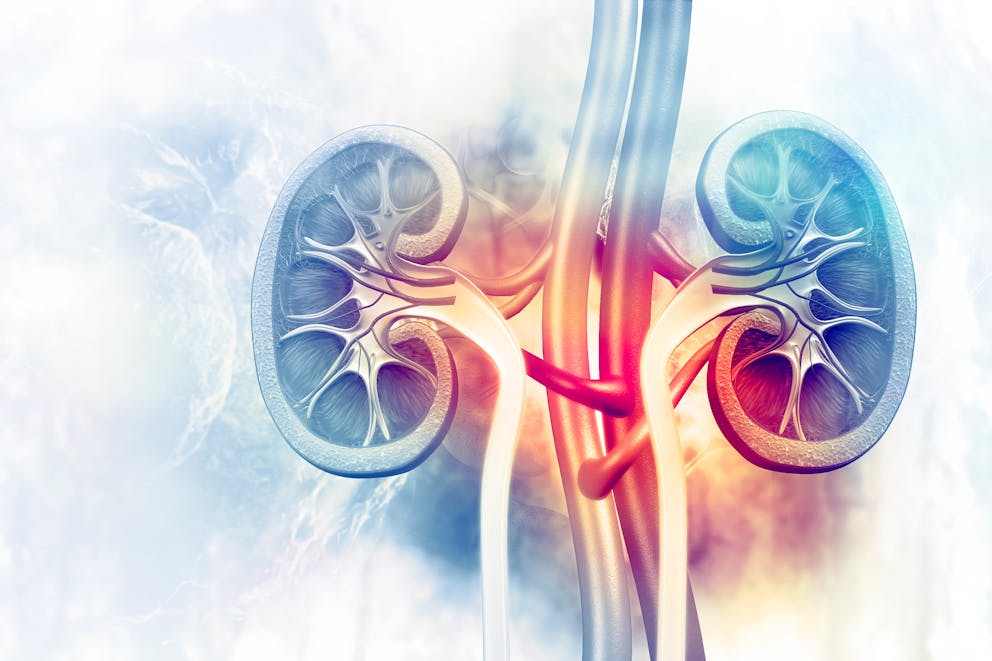
When not to increase your potassium intake
While most people benefit from increasing their potassium intake, some medical conditions increase the risk of dangerously elevated potassium levels, known as hyperkalemia.
Hyperkalemia is a rare but serious electrolyte imbalance that can cause arrhythmias, shortness of breath, fatigue, nausea, and vomiting.
Poor kidney function and low aldosterone levels—a common side effect of adrenal gland issues and Addison's disease—can impair the body’s ability to excrete potassium and lead to hyperkalemia.
If you have been diagnosed with kidney disease, Addison's disease, or adrenal gland insufficiency, it’s crucial to limit potassium intake and consult a healthcare provider if you plan to incorporate electrolyte-containing drinks into your routine.

Key takeaways
You can make your own electrolyte drink with potassium by blending avocado, berries, lemon juice, apple cider vinegar, pink Himalayan salt, and water.
This potassium-rich drink helps replenish electrolytes, boosts energy, promotes normal nerve functions, and supports healthy fluid balance crucial for blood pressure regulation and cellular energy production.
FAQ
1. What electrolyte drinks are high in potassium?
Most commercial electrolyte water drinks don’t contain enough potassium to maintain adequate levels.
Some brands of coconut water electrolyte drink are high in potassium. However, coconut water is high in sugar and carbs and can quickly lead to weight gain, making it an unsuitable source of electrolytes.
2. How do you add potassium to water naturally?
Blending natural ingredients high in potassium, such as avocado, berries, apple cider vinegar, lemon or lime juice, and Himalayan pink salt with plain water, makes a healthy drink rich in potassium and other essential electrolytes.
3. What can I add to water to make homemade electrolytes?
You can create your own potassium-rich electrolyte drink at home by mixing water with a pinch of salt, apple cider vinegar, and lemon or lime juice and blending it with avocado and berries.
Alternatively, you can make a homemade sports drink by adding a high-quality electrolyte powder that contains magnesium, calcium, sodium, and at least 1000 milligrams of potassium.
4. Do sports drinks contain enough potassium?
Unfortunately, most electrolyte drinks contain only around 30 to 90 milligrams of potassium per 8-ounce (240 ml) serving—a fraction of the recommended daily intake of 4,700 milligrams of potassium. It’s better to make your own electrolyte sports drink at home.
5. What are the best sources of potassium?
Avocados, spinach, tomatoes, mushrooms, nuts, pumpkin seeds, wild-caught salmon, clams, sea salt, lemon juice, and apple cider vinegar are good sources of potassium.
6. How much potassium do I need each day?
The recommended daily intake is around 4,700 milligrams of potassium daily for adults.
However, athletes and individuals with excessive sweating due to heat exposure or overactive sweat glands may lose electrolytes faster and require more potassium to replenish adequate levels.
7. What are the benefits of making your own electrolyte drink with potassium?
Most electrolyte drinks don’t contain enough potassium and are sweetened with sugar, orange juice, or syrups, which can cause hormonal imbalances linked to weight gain.
Making your own electrolyte drink lets you have control over the ingredients, and you can adjust the potassium content to meet your individual requirements.
8. What should I not add to a homemade electrolyte drink?
When making your own homemade electrolyte drink, limit sugars, syrups, and raw honey, and don’t add too much salt, as this can cause an imbalance in the potassium-to-sodium ratio, which increases the risk of dehydration and high blood pressure.
It’s best to avoid homemade electrolyte drink recipes that call for Crystal Light drink mix and Kool-Aid. These flavorings contain aspartame, an artificial sweetener linked to an increased cancer risk.
Previous blog
Male Version of PCOSNext blog
How to Test for Insulin ResistanceTags

Popular
08/21/2024
43.5K views
05/22/2024
39K views
11/18/2024
227.7K views
03/18/2024
11/21/2022




